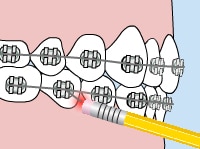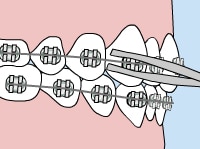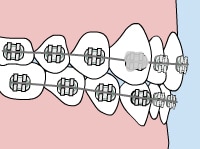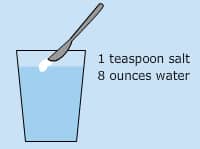At WingHaven® Orthodontics, we differentiate between emergencies and urgencies. Most situations that need orthodontic attention between regularly scheduled appointments can be described as urgencies, but on rare occasions, a true emergency may occur.
Orthodontic emergencies should be attended to as soon as possible by Dr. Held. Conversely, urgencies are best handled during normal business hours, when Dr. Held and her team can better assist you.
Emergencies
True orthodontic emergencies are rare. However, when they do occur, we are available to assist you however we can, during, before, or after business hours.
There are two types of true orthodontic emergencies:
1. Trauma/Injury to the Mouth, Due to a Facial or Oral Accident:
If there is severe trauma including a direct injury to your mouth or teeth, whether undergoing orthodontic treatment or not:
- Please seek medical assistance first, as soon as possible.
- Once you know that you are not in a life-threatening situation, immediately ice the injured area.
- Next, call your Primary Care Dentist’s (PCD’s) office as soon as possible, for assistance with the oral trauma that has occurred. Usually, an X-ray or scan of the involved tooth, teeth, or oral structure is needed to determine the extent of the injury. If a tooth has been displaced, knocked out, or fractured, it is best to contact your PCD first, since we may not have the necessary materials (including anesthetic) required to treat such injuries.
- Then, please call or text our office. If you have appliances that are dislodged or displaced, we will need to replace or adjust the appliances as soon as possible, after you have seen your PCD, depending upon your comfort level.
2. Expanders or Retainers Coming Out of Place:
If your expander or glued-in retainer dislodges, please call or text our office as soon as possible. There may be unwanted skeletal or dental changes that can occur in a short period of time, and we want to avoid any chance of a choking hazard. We will see you as soon as possible for repair.
Urgencies
As a general rule, you should call or text the office when you experience an uncomfortable appliance problem that you cannot take care of yourself. We will schedule an appointment to resolve the problem. Sometimes, appliances might become broken or bent during your orthodontic care. If there are any disturbances, such as loose bands, loose brackets, or broken or poking wires, please call or text our office to schedule an appointment that is during business hours. For your convenience and the convenience of scheduled patients, it is not possible to handle urgencies on a walk-in basis.
You might be surprised to learn that you may be able to temporarily solve many
problems yourself, until you schedule an appointment with our office. When working with your appliances, it is helpful for you to know the names of the parts of your appliances, so that you are able to identify which part is broken or out of place.
After alleviating your discomfort, it is very important that you still call or text our office as soon as possible to schedule a time to repair the problem. Allowing your appliance to remain damaged for an extended period of time may result in disruptions in your orthodontic treatment.
For any home remedy that you may use, please disinfect with rubbing alcohol or hydrogen peroxide any instrument or tool that you put into your mouth.
The following solutions may help you to relieve the discomfort, until we can see you in our office:
If One or More of Your Separators Fall Out
Click to expand instructions on how to replace a separator
1. Get two pieces of floss and the separator(s).

2. Thread the two pieces of floss through each separator, one at a time.

3. Then wrap the floss strings around your middle fingers to hold, using your pointer fingers and thumbs to guide the floss.

4. Pull your middle fingers away from each other, so that the separator is almost flat, and tension is created.

5. Just as you would in flossing, gently work the separator between your teeth. Make sure that you can see half of the separator above the point of contact between the teeth, while the other half is below, like having a doughnut wrapped around the two teeth contact.

6. Pull the floss out gently, without removing the separator with the floss. It may be necessary to hold your fingers gently on the separator when you pull the floss out.

Poking Wire

Use a disinfected pencil eraser, spoon handle, or set of tweezers to push the poking wire down, or place wax on it to alleviate the discomfort. When placing wax, use a cotton swab, a cotton ball, or a tissue to dry the area first, as wax does not stick well in a wet environment. A cotton swab works the best. Take care not to catch the braces with the cotton ball or tissue.
Loose Wire

Use disinfected tweezers or jewelry pliers to attempt to reposition your wire properly.
Additionally, you can place wax over the wire to alleviate the discomfort. When placing wax, use a cotton swab, a cotton ball, or a tissue to dry the area first, as wax does not stick well in a wet environment. A cotton swab works the best. Take care not to catch the braces with the cotton ball or tissue.
If either of these two remedies does not help, as a last resort, you may use a brand new, disinfected, unused pair of toenail clippers, or a disinfected cutter, to clip the wire behind the last tooth to which the wire is securely fastened. When clipping the wire, make sure to place a cotton ball or a tissue behind the end of the piece of wire being cut off, to protect the cheek and gums.
If the wire comes out entirely, schedule a repair appointment with our office, and bring all parts of your appliance to the appointment.
Loose Bracket or Band

If your band is loose, keep it in a stable position until you can come to our office for a repair appointment.
If your bracket is loose and is still attached to the wire, you can either leave it in place and put wax on it (if needed), or push it to the next bracket for support, dry it with a cotton swab, a cotton ball, or a tissue, and put wax on it. A cotton swab works the best. Take care not to catch the braces with the cotton ball or tissue.
Loose Baby Tooth
There are times during orthodontic treatment when we cement bands to baby teeth and use them as “handles” to support treatment of the other teeth and the jaws. Throughout orthodontic treatment, Dr. Held monitors the status of the baby teeth that are being used in this way. Every so often, a baby tooth surprises us and loosens quickly, earlier than expected. If this happens, do not panic, but please call or text our office for assistance.
Loosening of Permanent Teeth
Loosening or mild mobility of permanent teeth throughout treatment is normal. The act of moving teeth requires that they be loosened. Once they are in their new positions and in retention, loose teeth will become solid again.
Poking or Loose Appliance
If your appliance is poking you, dry the offending part of your appliance with a cotton swab, a cotton ball, or a tissue, and put wax on it. A cotton swab works the best. Take care not to catch the braces with the cotton ball or tissue.
If your appliance is loose, schedule a repair appointment with our office, dry the offending part of your appliance and put wax on it.
General Soreness
When you have just started wearing braces, you may feel general soreness in your mouth, and teeth may be tender to biting pressures for 1 to 7 days. This soreness can feel like touching a bruise and can be relieved by chewing on a bite wafer. Bite wafers come in several flavors Just ask us for one!
Additionally, soreness can be soothed by rinsing your mouth with a warm salt-water rinse. Dissolve one teaspoonful of salt in 8 ounces of warm water, and rinse your mouth vigorously.

Placing an over-the-counter topical anesthetic (such as Anbesol®) on the affected area may also help. This soothing aid can be found in your local pharmacy or grocery store.
If the tenderness is interfering with your daily routine, take the recommended dose of over-the-counter ibuprofen (Advil® or Motrin®), as long as your primary care physician has not instructed you otherwise. Ibuprofen is a non-steroidal anti-inflammatory drug. The anti-inflammatory property should give relief in addition to the “anti-discomfort” property. Only short-term use is recommended, as the same property that relieves the discomfort also prevents tooth movement. For those who don’t respond ideally to ibuprofen, naproxen (Aleve®) can be taken instead of (but not in combination with) ibuprofen.
While Tylenol® will address discomfort, it is not an anti-inflammatory medicaton. Thus, it will not alleviate the inflammatory response that occurs when moving the teeth.
Your lips, cheeks, and tongue may also become irritated for 1 to 2 weeks, as they toughen and become accustomed to the surface of the braces. You can put wax on the braces to lessen this irritation. We will show you how! When placing wax, use a cotton swab, a cotton ball, or a tissue to dry the area first. Wax does not stick well in a wet environment. A cotton swab works the best. Take care not to catch the braces with the cotton ball or tissue.







